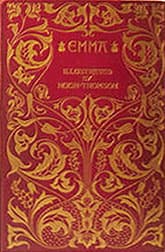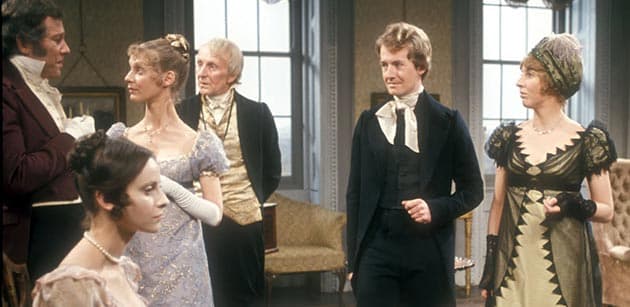Emma
Critique • Quotes • At the movies
 1897 edition
1897 editionFirst publication
1815
Literature form
Novel
Genres
Literary, romance
Writing language
English
Author's country
England
Length
Approx. 155,000 words

Knightley (left) and Emma converse while others react—or don't—in a scene from Emma (1972).
Old-style drama on screen
Emma (1972): Television serial, six episodes of 45 minutes each; director John Glenister; writer Denis Constanduros; featuring Doran Godwin, John Carson, Donald Eccles, Ania Marson, Constance Chapman, Robert East, Timothy Peters, Fiona Walker
I was entranced in this early Emma series—taking in one of those drawing room scenes involving nearly every major character—when I realized I was watching it like a classical stage play.
Maybe it was the broad but subtle theatrical acting. Or how the British actors projected to be heard at the back of the hall without appearing to strain. Or the deliberate camera work that roved unobtrusively among the conversational groups as a stage audience's eyes would.
Or perhaps it was the writing that gave each personality a turn on the screen to expose their inner thoughts in their own speech or in reaction to others' speech, so in this grand scene we the viewers glimpsed the interconnected emotions raging beneath those polite exteriors.
Now, the staginess of this Emma is often a matter of criticism, especially when the production is compared to later more cinematic adaptations of Jane Austen's most problematic but popular novel.
But let's bear in mind this series was first broadcast in 1972. It was still early days for the BBC's transfer of great literature to the small screen, when such work was often marketed as classic or masterpiece theatre.
Moreover, the staginess is evidently intentional. The writer, director and cast want their Emma to give us the sense we have prestige seats at a masterful stage play.
If our modern eyes can settle into accepting this, the 1972 serial offers us one of the best adaptations of Emma still available. The only jarring moments come in this production during the few attempts to introduce more cinematically advanced touches, such as suddenly zooming in on a character's face, creating a melodramatic effect.
Stills from 1972's Emma serial set to the show's theme music "The Ash Grove".
Otherwise, the old-fashioned theatricality serves Emma well. Whether you consider it a play or a movie, this is a very faithful adaptation. It takes advantage of the four-hours-plus to deliver Austen's story in all its nuance of character and plot.
The actors are relatively unknown—at least compared to the stars who would line up for the roles in later productions. But for the most part they present dead-on portrayals of the novel's figures in their constrained but effective manner.
At the centre, of course, is the British actor playing Emma. Detractors, perhaps comparing her work to those later star turns, complain Doran Godwin has little charisma. And admittedly Godwin is no raving beauty or magnetic personality on screen. But I don't think she has to be. It took me a while to warm up to her as Emma, but eventually her different style of charm won me over to being alternately annoyed and delighted and annoyed again with her—much as readers of the book experience the character. As to her appearance...well, she looks very much as I imagine Austen herself looked.
Another journeyman professional, John Carson, is also unexciting as Emma's mentor but he's winsome in a slow-acting manner, until by the end it seems natural that the two fall for each other. Very sensibly so, as it's shown. (Some may find disturbing that he is obviously much older that she—as in the novel—and that the two behave as sister and older brother through much of the series, giving a slight incest flavour to their eventual pairing. No comment on this.)
The rest of the characters, who exist mainly as aids or foils to developing Emma's character, are essayed competently and at times entertainingly by the similarly acute cast.
If it's Jane Austen's Emma you want, unadulterated and unromanticized by modern movie sensibilities, the old-style 1972 serial is worth getting immersed in.
— Eric

